Book review: Farmers or Hunter-gatherers? The Dark Emu Debate rigorously critiques Bruce Pascoe's argument
- Written by Christine Judith Nicholls, Honorary Senior Lecturer, ANU, Australian National University
Eminent Australian anthropologist Peter Sutton and respected field archaeologist Keryn Walshe have co-authored a meticulously researched new book, Farmers or Hunter-gatherers? The Dark Emu Debate. It’s set to become the definitive critique of Bruce Pascoe’s Dark Emu: Black Seeds — Agriculture or Accident?
First published in 2014, Pascoe’s Dark Emu has spawned numerous derivatives. Pascoe contends that in pre-contact times, Australian Aboriginal people weren’t “mere” hunter-gatherers, but agriculturalists. Descriptors like “simple” or “mere” are anathema to people like me who’ve lived long-term with hunter-gatherers.
For many Australians, Pascoe’s book is a “must-read”, speaking truth to power. For such readers, Dark Emu seems a breakthrough text. Not so, in Sutton and Walshe’s estimation. Nor mine.
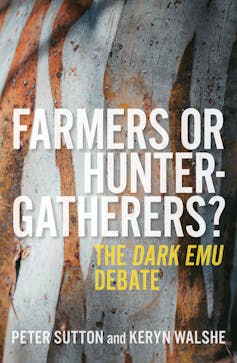 Underpinning Dark Emu is the author’s rhetorical purpose. This proselytising is partly achieved by painstaking “massaging” of his sources, a practice forensically examined by Walshe and Sutton. It has led to converts to Pascoe’s dubious proposition. But this willingness to accept Pascoe’s argument reveals a systemic area of failure in the Australian education system.
On the basis of long-term research and observation, Sutton and Walshe portray classical Australian Aboriginal people as highly successful hunter-gatherers and fishers. They strongly repudiate racist notions of Aboriginal hunter-gatherers as living in a primitive state.
In their book, they assert there was and is nothing “simple” or “primitive” about hunter-gatherer-fishers’ labour practices. This complexity was, and in many cases, still is, underpinned by high levels of spiritual/cultural belief.
Not agriculturalists
As Sutton attests, seeds were and are occasionally deliberately scattered. But in classical Aboriginal societies they were never planted nor watered for agricultural purposes. Such aforementioned rituals are collectively called “increase ceremonies”. Sutton’s alternative term, “maintenance ceremonies”, invokes spiritual propagation as opposed to oversupply.
Their objective was continuing subsistence. Australia’s hunter-gatherer-fishers left an extremely light carbon footprint — the diametric opposite of many contemporary agricultural/industrial practices. The photo below, taken in 1932 or earlier, shows Pilbara people throwing yelka (nutgrass) — not threshing or scattering seeds.
Underpinning Dark Emu is the author’s rhetorical purpose. This proselytising is partly achieved by painstaking “massaging” of his sources, a practice forensically examined by Walshe and Sutton. It has led to converts to Pascoe’s dubious proposition. But this willingness to accept Pascoe’s argument reveals a systemic area of failure in the Australian education system.
On the basis of long-term research and observation, Sutton and Walshe portray classical Australian Aboriginal people as highly successful hunter-gatherers and fishers. They strongly repudiate racist notions of Aboriginal hunter-gatherers as living in a primitive state.
In their book, they assert there was and is nothing “simple” or “primitive” about hunter-gatherer-fishers’ labour practices. This complexity was, and in many cases, still is, underpinned by high levels of spiritual/cultural belief.
Not agriculturalists
As Sutton attests, seeds were and are occasionally deliberately scattered. But in classical Aboriginal societies they were never planted nor watered for agricultural purposes. Such aforementioned rituals are collectively called “increase ceremonies”. Sutton’s alternative term, “maintenance ceremonies”, invokes spiritual propagation as opposed to oversupply.
Their objective was continuing subsistence. Australia’s hunter-gatherer-fishers left an extremely light carbon footprint — the diametric opposite of many contemporary agricultural/industrial practices. The photo below, taken in 1932 or earlier, shows Pilbara people throwing yelka (nutgrass) — not threshing or scattering seeds.
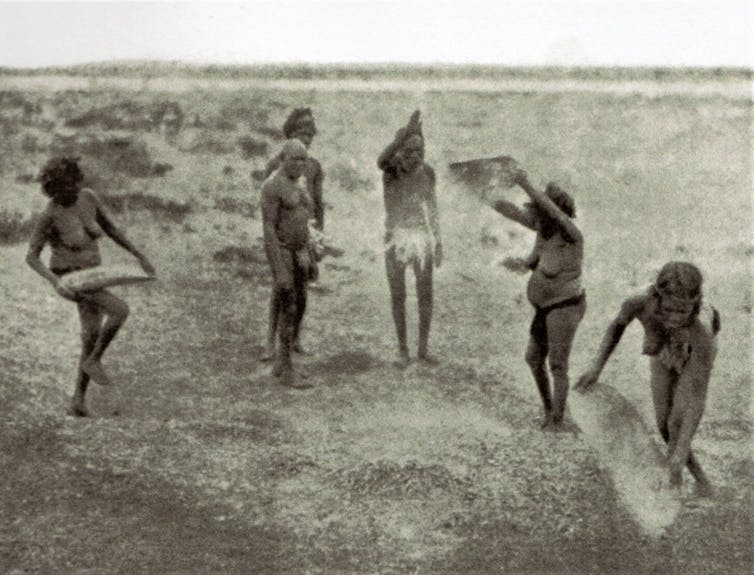 ‘Increase ceremony’ for yarrinyarri (nutgrass), north-west Australia.
Ralph Piddington, ‘Totemic system of the Karadjeri tribe’, Oceania 4, 1932, pp. 376–93, Plate II.
Pascoe’s sources and approach
Pascoe draws on records of explorers and early colonists, also citing recent works, including Bill Gammage’s The Biggest Estate on Earth: How Aborigines made Australia. Dark Emu leans most heavily on the work of the late historian/ethnographer Rupert Gerritsen.
Read more:
Friday essay: Dark Emu and the blindness of Australian agriculture
Counter-intuitively, Pascoe mainly cites non-Aboriginal sources. There is no real “voice” given to the few remaining people who lived traditional lives as youngsters, or are cited in books or articles.
While some have described Dark Emu as fabrication, Sutton and Walshe are more measured. They methodically show that in Dark Emu, Pascoe has removed significant passages from publications that contradict his major objectives. This boosts his contention that all along Aboriginal people were farmers and/or aquaculturalists.
One example concerns Pascoe’s quoting of the journal entries of the explorer Charles Sturt. Sutton writes:
Sturt is quoted [by Pascoe] on his party’s discovery of a large well and ‘village’ of 19 huts somewhere north of Lake Torrens in South Australia.
This “village” concept arose from colonial records, and is still sometimes used in recent articles.
Pascoe’s edit of Sturt’s original 1849 text breathes oxygen into Dark Emu’s polemical edge. It’s misleading at best. For Sturt’s diary reveals Aboriginal people didn’t live in “houses” in any single site all year round.
‘Increase ceremony’ for yarrinyarri (nutgrass), north-west Australia.
Ralph Piddington, ‘Totemic system of the Karadjeri tribe’, Oceania 4, 1932, pp. 376–93, Plate II.
Pascoe’s sources and approach
Pascoe draws on records of explorers and early colonists, also citing recent works, including Bill Gammage’s The Biggest Estate on Earth: How Aborigines made Australia. Dark Emu leans most heavily on the work of the late historian/ethnographer Rupert Gerritsen.
Read more:
Friday essay: Dark Emu and the blindness of Australian agriculture
Counter-intuitively, Pascoe mainly cites non-Aboriginal sources. There is no real “voice” given to the few remaining people who lived traditional lives as youngsters, or are cited in books or articles.
While some have described Dark Emu as fabrication, Sutton and Walshe are more measured. They methodically show that in Dark Emu, Pascoe has removed significant passages from publications that contradict his major objectives. This boosts his contention that all along Aboriginal people were farmers and/or aquaculturalists.
One example concerns Pascoe’s quoting of the journal entries of the explorer Charles Sturt. Sutton writes:
Sturt is quoted [by Pascoe] on his party’s discovery of a large well and ‘village’ of 19 huts somewhere north of Lake Torrens in South Australia.
This “village” concept arose from colonial records, and is still sometimes used in recent articles.
Pascoe’s edit of Sturt’s original 1849 text breathes oxygen into Dark Emu’s polemical edge. It’s misleading at best. For Sturt’s diary reveals Aboriginal people didn’t live in “houses” in any single site all year round.
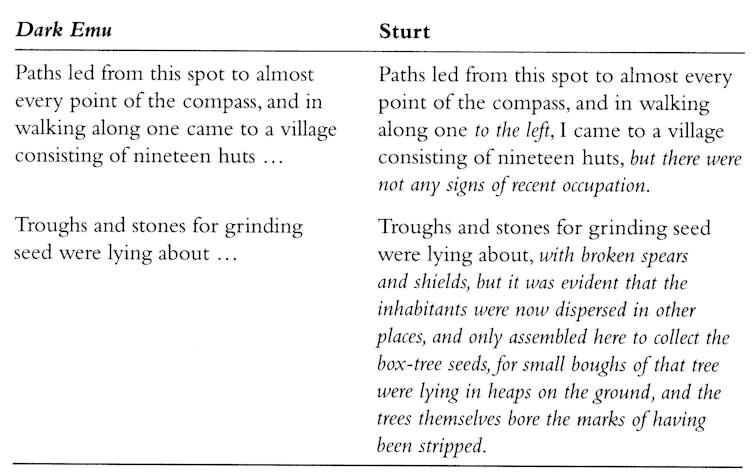 Page 153, Dark Emu Debate.
Such accounts destabilise Pascoe’s argument, reinforced by ethnographic, colonial, and archaeological records.
Hunter-gatherers did alter the country in significant ways — most Australians know about the ancient practice of firing the country, recently discussed in depth owing to our increasingly devastating bush-fires. This involved ecological agency and prowess. But expert fire-burning isn’t an agricultural practice, as Pascoe avers.
Page 153, Dark Emu Debate.
Such accounts destabilise Pascoe’s argument, reinforced by ethnographic, colonial, and archaeological records.
Hunter-gatherers did alter the country in significant ways — most Australians know about the ancient practice of firing the country, recently discussed in depth owing to our increasingly devastating bush-fires. This involved ecological agency and prowess. But expert fire-burning isn’t an agricultural practice, as Pascoe avers.
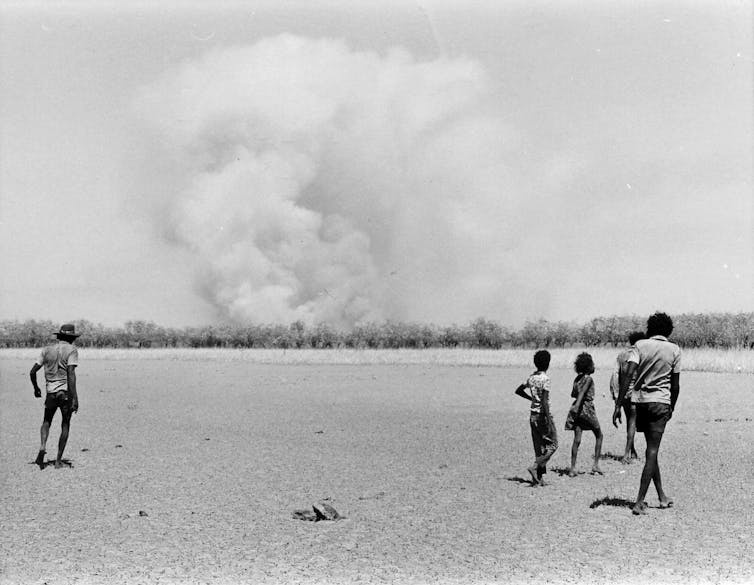 Wik people firing the country, middle Kirke River, Cape York Peninsula, 1977.
Photo by Peter Sutton
Read more:
Indigenous expertise is reducing bushfires in northern Australia. It's time to consider similar approaches for other disasters
Misidentification of implements
In a key chapter, Walshe homes in on Pascoe’s mis-interpretations of hunter-gatherer implements, which he labels “agricultural” tools. For instance, Pascoe misconstrues grooved “Bogan Picks” as heavy stones used for agricultural activity.
Walshe disputes Pascoe’s claim, stating that, “with their adze-shaped end and grooved midline for hafting, they were likely used in a similar way to stone axes.”
Wooden digging sticks were also used for breaking up the earth to extract yams when in season, among various other purposes — not for “tilling” or “ploughing” the soil in preparation for planting seeds.
Wik people firing the country, middle Kirke River, Cape York Peninsula, 1977.
Photo by Peter Sutton
Read more:
Indigenous expertise is reducing bushfires in northern Australia. It's time to consider similar approaches for other disasters
Misidentification of implements
In a key chapter, Walshe homes in on Pascoe’s mis-interpretations of hunter-gatherer implements, which he labels “agricultural” tools. For instance, Pascoe misconstrues grooved “Bogan Picks” as heavy stones used for agricultural activity.
Walshe disputes Pascoe’s claim, stating that, “with their adze-shaped end and grooved midline for hafting, they were likely used in a similar way to stone axes.”
Wooden digging sticks were also used for breaking up the earth to extract yams when in season, among various other purposes — not for “tilling” or “ploughing” the soil in preparation for planting seeds.
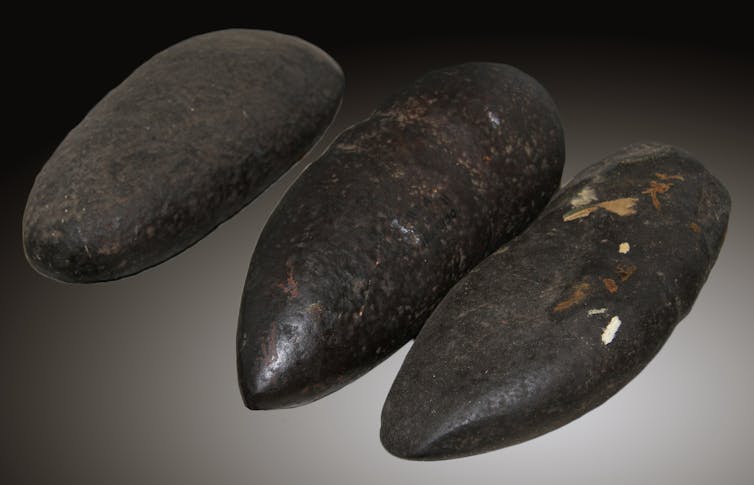 Grooved (Bogan style) picks.
Photo by Malcolm Davidson
Language used by early colonists and explorers — words like “village” and “picks” — befuddles readers. British colonists’ monolingualism meant they used English words, often imposed arbitrarily, to name never-before-seen hunter-gatherer implements. For example, “Bogan Pick” references the nearby Bogan River.
Hunter-gatherer mobility and stasis
Sutton expertly summarises the experience of escaped convict, William Buckley, who spent 32 years travelling around country with the Wathawurrung people in Central Victoria.
Over time, Buckley became fluent in the language of his Wathawurrung hosts. Later, his oral account of the hunter-gatherer group’s approximate lengths of mobility and stasis at numerous sites was transcribed. It’s a unique document covering a significant timespan.
This account reinforces earlier chapters in Dark Emu Debate. Sutton and Walshe make it crystal clear that Aboriginal people weren’t “simple nomads” wandering around randomly, opportunistically searching for food and water. They knew their country intimately.
Rather, hunter-gatherers engaged in purposeful travel to sites with which they familiar and able to source seasonally available food, water and shelter at variable times of year.
Grooved (Bogan style) picks.
Photo by Malcolm Davidson
Language used by early colonists and explorers — words like “village” and “picks” — befuddles readers. British colonists’ monolingualism meant they used English words, often imposed arbitrarily, to name never-before-seen hunter-gatherer implements. For example, “Bogan Pick” references the nearby Bogan River.
Hunter-gatherer mobility and stasis
Sutton expertly summarises the experience of escaped convict, William Buckley, who spent 32 years travelling around country with the Wathawurrung people in Central Victoria.
Over time, Buckley became fluent in the language of his Wathawurrung hosts. Later, his oral account of the hunter-gatherer group’s approximate lengths of mobility and stasis at numerous sites was transcribed. It’s a unique document covering a significant timespan.
This account reinforces earlier chapters in Dark Emu Debate. Sutton and Walshe make it crystal clear that Aboriginal people weren’t “simple nomads” wandering around randomly, opportunistically searching for food and water. They knew their country intimately.
Rather, hunter-gatherers engaged in purposeful travel to sites with which they familiar and able to source seasonally available food, water and shelter at variable times of year.
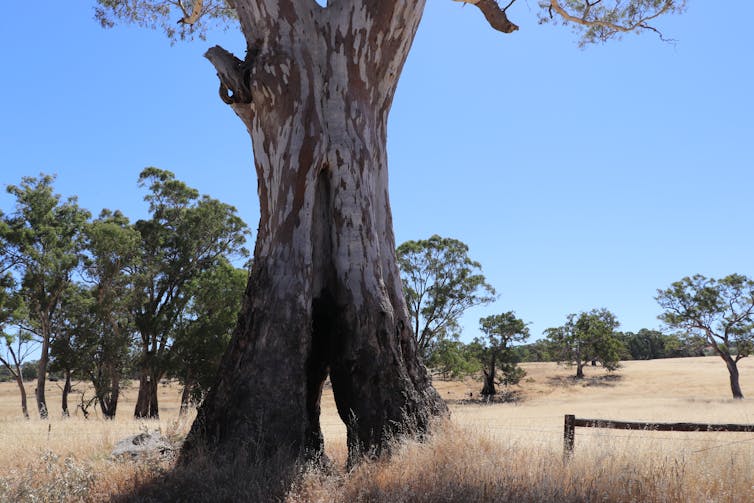 Shelter Tree, Eden Valley 2021.
Keryn Walshe
Another conspicuous weakness in Dark Emu’s approach, pinpointed by Sutton and Walshe, is Pascoe’s penchant for choosing exceptions to the general rule, implying that these atypical practices were widespread or universal. It’s another strategy to consolidate his argument but involves eliding vital information.
Pre-contact aquaculture
Pascoe offers two examples of “aquacultural” practice, one in Brewarrina (NSW) in the bed streams of the Barwon River, and the other in Lake Condah, in south-western Victoria.
He seizes on rock use in the Brewarrina fishery and Lake Condah’s fish and seasonal eel trapping as “proof” of Aboriginal people’s aqua/agricultural prowess — giving the impression they created these complex hydrological systems from scratch.
But Sutton writes, “The fish traps of Brewarrina … were not claimed as the ingenious works of human beings, but … regarded as having been put there in the Dreaming, by Dreamings.” Both he and Walshe readily acknowledge the fact that Aboriginal people use/d their human agency to create modifications. It’s not an either/or matter.
Shelter Tree, Eden Valley 2021.
Keryn Walshe
Another conspicuous weakness in Dark Emu’s approach, pinpointed by Sutton and Walshe, is Pascoe’s penchant for choosing exceptions to the general rule, implying that these atypical practices were widespread or universal. It’s another strategy to consolidate his argument but involves eliding vital information.
Pre-contact aquaculture
Pascoe offers two examples of “aquacultural” practice, one in Brewarrina (NSW) in the bed streams of the Barwon River, and the other in Lake Condah, in south-western Victoria.
He seizes on rock use in the Brewarrina fishery and Lake Condah’s fish and seasonal eel trapping as “proof” of Aboriginal people’s aqua/agricultural prowess — giving the impression they created these complex hydrological systems from scratch.
But Sutton writes, “The fish traps of Brewarrina … were not claimed as the ingenious works of human beings, but … regarded as having been put there in the Dreaming, by Dreamings.” Both he and Walshe readily acknowledge the fact that Aboriginal people use/d their human agency to create modifications. It’s not an either/or matter.
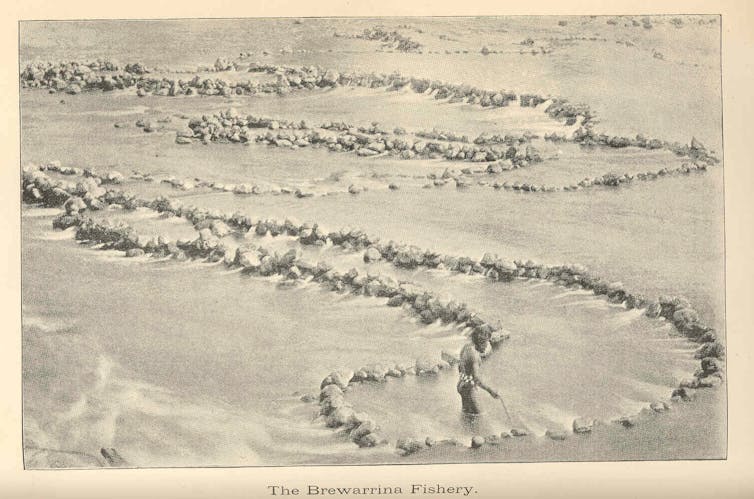 Brewarrina Fishery (‘Baiames Ngunnhu’), photograph Lindsay G. Thompson, 1893.
University of Washington, Wikimedia Commons
However, a chapter written by Walshe throws light on the seismic activity that forged Lake Condah’s unique terrain and waterways. This area, she writes, is part of
a volcanic system … last active … 9,000 years ago, with a major eruption much earlier, about 37,000 thousand years ago, causing a massive lava flow across the pre-existing drainage system.
The natural tilt southwards, she explains, facilitated “naturally formed ancient river channels … to reach the Southern Ocean”.
This enabled migratory fish to spawn. Fish, and at certain times of year, eels, swam through both fresh and salty water — making for ease of catching. Local Aboriginal people moved the heavy stones into semi-circular formations to enable netting, spearing or grabbing by hand, possibly creating further semi-captivity of these food staples.
In this way, hunter-gatherers consistently and constantly “value-added” to, or enhanced, nature’s creation.
Brewarrina Fishery (‘Baiames Ngunnhu’), photograph Lindsay G. Thompson, 1893.
University of Washington, Wikimedia Commons
However, a chapter written by Walshe throws light on the seismic activity that forged Lake Condah’s unique terrain and waterways. This area, she writes, is part of
a volcanic system … last active … 9,000 years ago, with a major eruption much earlier, about 37,000 thousand years ago, causing a massive lava flow across the pre-existing drainage system.
The natural tilt southwards, she explains, facilitated “naturally formed ancient river channels … to reach the Southern Ocean”.
This enabled migratory fish to spawn. Fish, and at certain times of year, eels, swam through both fresh and salty water — making for ease of catching. Local Aboriginal people moved the heavy stones into semi-circular formations to enable netting, spearing or grabbing by hand, possibly creating further semi-captivity of these food staples.
In this way, hunter-gatherers consistently and constantly “value-added” to, or enhanced, nature’s creation.
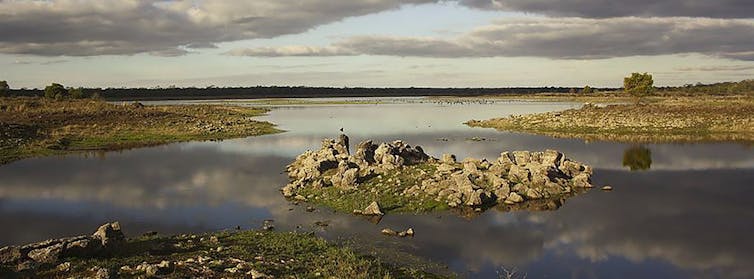 Lake Condah in the Budj Bim National Heritage Landscape.
Budj Bim/AAP
Read more:
The detective work behind the Budj Bim eel traps World Heritage bid
Not a bunfight
Pascoe’s skilful editing of his sources involves conscious, deliberate intervention. Does he hope Dark Emu will convince people to change their belief in the noxious evolutionary ladder, once uniformly, but still sometimes, applied to different groups of homo sapiens?
Lake Condah in the Budj Bim National Heritage Landscape.
Budj Bim/AAP
Read more:
The detective work behind the Budj Bim eel traps World Heritage bid
Not a bunfight
Pascoe’s skilful editing of his sources involves conscious, deliberate intervention. Does he hope Dark Emu will convince people to change their belief in the noxious evolutionary ladder, once uniformly, but still sometimes, applied to different groups of homo sapiens?
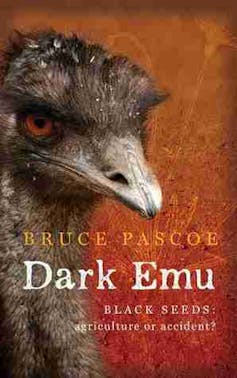 Or was his book written to prove Aboriginal people were/are more like Europeans, which could perhaps lead to much needed progress on reconciliation? Perhaps that accounts for its rapturous reception by many Australians, especially the young.
Why not simply celebrate the long-term achievements of hunter-gatherers?
Hunter-gatherers worked in concert with the natural world, not against it as most humans do today, resulting in insoluble difficulties such as overcrowding, pandemics and toxic agricultural and aquacultural practices. Survival depends on this. For eons, it ensured the continuity and the continuing existence of Australia’s hunter-gatherer people and their culture.
Farmers or Hunter Gatherers? The Dark Emu Debate needs to be read carefully, keeping an open mind. The book’s focus is on both material and spiritual economies and their misrepresentation. Despite racist commentary from some, this isn’t an exclusively right or left-wing issue or a bunfight.
Bruce Pascoe’s Dark Emu will continue to be granted recognition, if not immortality. But Sutton and Walshe’s Dark Emu Debate will undoubtedly be acclaimed. As a critique of Pascoe’s book, it’s just about perfect — a volume with the twin virtues of rigour and readability.
Farmers or Hunter Gatherers? The Dark Emu Debate is published by Melbourne University Press and will be released 16 June 2021.
Or was his book written to prove Aboriginal people were/are more like Europeans, which could perhaps lead to much needed progress on reconciliation? Perhaps that accounts for its rapturous reception by many Australians, especially the young.
Why not simply celebrate the long-term achievements of hunter-gatherers?
Hunter-gatherers worked in concert with the natural world, not against it as most humans do today, resulting in insoluble difficulties such as overcrowding, pandemics and toxic agricultural and aquacultural practices. Survival depends on this. For eons, it ensured the continuity and the continuing existence of Australia’s hunter-gatherer people and their culture.
Farmers or Hunter Gatherers? The Dark Emu Debate needs to be read carefully, keeping an open mind. The book’s focus is on both material and spiritual economies and their misrepresentation. Despite racist commentary from some, this isn’t an exclusively right or left-wing issue or a bunfight.
Bruce Pascoe’s Dark Emu will continue to be granted recognition, if not immortality. But Sutton and Walshe’s Dark Emu Debate will undoubtedly be acclaimed. As a critique of Pascoe’s book, it’s just about perfect — a volume with the twin virtues of rigour and readability.
Farmers or Hunter Gatherers? The Dark Emu Debate is published by Melbourne University Press and will be released 16 June 2021.
Authors: Christine Judith Nicholls, Honorary Senior Lecturer, ANU, Australian National University




